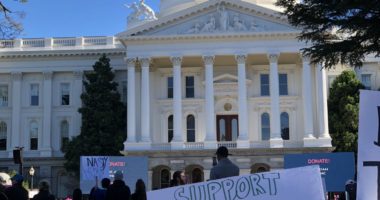Biden Cancels $10,000 in Student Debt. But What Do Borrowers Really Want?
President Biden announced today that his administration will cancel $10,000 in student loans for federal student loan borrowers for individuals making less than $125,000 a year, and $20,000 for Pell Grant recipients. Today’s decision also includes a final extension of the student loan payment pause through December 31, 2022, as well as an announcement of a new borrower repayment plan that will reduce future monthly payments on undergraduate loans.
This move will provide economic relief to tens of millions of borrowers who are suffering under the weight of student debt at a time of burgeoning inflation for everyday items. However, this measure doesn’t go far enough.
Ed Trust’s interim CEO Denise Forte said today in a statement: “Though cancellation, extending the payment pause to the end of the year, and the announcement of a new income-driven repayment plan are the correct decisions, it must be said that limiting the relief to these amounts represents a missed opportunity to do more to close the racial wealth gap, alleviate default rates, and prevent millions more borrowers from being burdened with decades-long debt payments that they are unlikely to ever pay off. ”
This is why Ed Trust is continuing to advocate for canceling at least $50,000 in federal student debt.
While student debt affects all borrowers, Black students face greater hurdles when it comes to paying for college and repaying student loans. Due to several systemic barriers, Black students are more likely to borrow, borrow more, struggle with repayment, and default on their student loans than their peers.
In Ed Trust’s report, Jim Crow Debt: How Black Borrowers Experience Student Loans, we share stories from Black borrowers on how student debt negatively affects them and what solutions should be implemented. Eighty percent of the nearly 1,300 Black borrowers we surveyed support the cancellation of ALL student debt. For many of those surveyed, debt cancellation was a matter of racial justice.
“As an engaged citizen who follows the news, I’m definitely aware of the ways that loans have been predatory and have exacerbated disparities between different racial groups and socioeconomic groups, and so I’m all for that cancellation — because it really shouldn’t be a death sentence, something that you hold onto for life,” said Tim (who owes $20,000).
Leonard (who owes $205,000) said, “Realistically, I think the [student loan] system is working exactly as we expect it to. Like, it was designed for this very outcome and so no one’s surprised that we somehow built a financial aid process and policy and set that up to only consider your annual salary, as if [Black people] all have the same net assets.”
Steve (who owes $130,000) said, “I think it’s unfair for your life to be dictated like that, so I think canceling that student loan would be phenomenal because it would help people come up to better choose what they want to do…When people aren’t worrying about paying student loans, they’re stimulating the economy: You erase $130,000 off my debt, I’m for sure going to be able to put that back into something else. So to me, it’s kind of a no-brainer.”
Belle (who owes $171,000) said, “I would love if we had student loan cancellation, not just because I owe a whole lot of money for student loans, but because the American Dream is about education. We push education — and there have been trends throughout the years where it used to be your bachelor’s degree was a big deal, then it became you need your master’s degree, now a Ph.D. … So it’s like we’re asking for more education for jobs, and so most people don’t have a choice but to take out loans.”
As many of my Ed Trust colleagues say, any solution to the Black student debt crisis must not only address the immediate needs of those with existing debt but help future generations of Black students complete college without crushing debt. Resources must go to the students who struggle the most to pay and the colleges that serve the greatest shares of students of color. So, while $10,000 is a starting point, it doesn’t go nearly far enough. Let’s keep pushing for more student debt cancellation.












